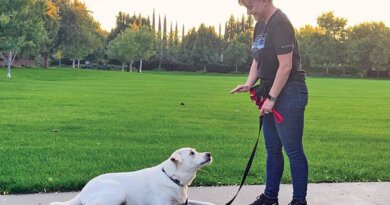Is 13 Old for a Golden Retriever? What Is the Average Golden Retriever Lifespan?
[ad_1]
This post may contain affiliate links. We may earn money or products from the companies mentioned in this post.
Our golden retrievers are such beloved members of the family, we wish that they could live forever.
Generally, larger dogs have shorter lifespans than smaller dogs do.
A study in the American Naturalist that drew data from the Veterinary Data Base covering 74 breeds and more than 50,000 dogs reviewed when and how they died.
They came to the conclusion that large dogs age at an accelerated pace.

Unfortunately, goldens also often have health issues that shorten their lives.
Average Lifespan for Golden Retrievers
The average lifespan for golden retrievers, according to the American Kennel Club (AKC) and other authorities, is 10 to 12 years old.
Unfortunately, golden retrievers’ lifespan has been decreasing over the years,
In the 1970s, goldens commonly lived to be 16 or 17 years old. That’s the exception now, not the rule.
A golden retriever named Augie celebrated her twentieth birthday and was said to be the oldest-living golden at the time.
She was adopted when she was 14 years old. Of course, she was given a birthday celebration to mark the happy occasion.
How Fast Do Goldens Age?
Years ago, people thought that dogs aged seven years for every human year.
However, the AKC currently reports that dogs are considered teenagers of about 15 years old when they’re one year old.
In their second year, they age another nine human years.
After that, they age about the equivalent of five human years for every year. Of course, for larger breeds, the time table is accelerated.
Golden retrievers aren’t considered to be adults until approximately two to three years of age.
Factors That Influence A Golden Retriever’s Lifespan
There are many factors that influence a golden’s lifespan. Of course, genetics is a major factor.
Sixty percent of goldens die of cancer in the United States. However, less than 40 percent of European goldens die of cancer.
If you’ve been following our blog for a while then you probably saw our English Cream Golden Retriever litters. We partnered with a breeder and donated our Goldens to service dog organizations. The breeder we partnered with mixed European Goldens with American Goldens to try and produce healthier puppies.
The Morris Animal Foundation is conducting a $32 million lifetime study of over 3,000 goldens to figure out the factors affecting their lifespans. Genetics, health, and environmental factors are being considered.
Although the reason for the increase of cancer in goldens isn’t fully understood yet, a recent genetic mutation is thought to be a culprit.
Goldens with hemangiosarcoma and lymphoma have genetic alterations that make them more likely to develop those cancers.
Golden Retrievers are also more likely to die of bone cancer, lymphoma, and blood cancer than other dog breeds, a 2015 Golden Retriever Lifetime Study found.
The popularity of goldens has also harmed this amazing breed. According to the AKC, they are the third most popular breed.
Poorly or over-bred specimens, such as those found in puppy mills, are also prone to more health problems than well-bred goldens are.
Other health problems that goldens and some other large breeds are more susceptible to also can shorten a golden’s lifespan. These include bloat, arthritis and joint problems, and conditions associated with obesity such as diabetes.
And goldens face other health problems as they age, including: hip dysplasia, skiing conditions, heart problems, cataracts, Von Willebrand Disease, and Hypothyroidism.
Of course, good nutrition, exercise, and neutering can also influence how long a dog will live.
Ways To Help Your Golden Retriever Live Longer
Of course, there are no guarantees regarding what will increase your beloved golden’s lifespan.
But there are some common-sense measures you can take to help increase the odds that he’ll live a long, healthy life.
1. Choose the Right Dog
It may sound obvious, but choosing a healthy dog can mean a dog without or with fewer health problems.
Choosing a good breeder is a good start. Research your breeder.
Knowledgeable, caring breeders do extensive health testing before breeding any dog. And they won’t breed one who doesn’t pass muster.
A good breeder will encourage you to meet the mother of the litter and will question you about why you want a golden. They’ll also ask questions about what you know about the breed, how you’ll raise the dog, and how you’ll care for him.
A breeder that has been breeding for only a few years generally isn’t desirable.
Or if the puppies haven’t seen a vet and received appropriate vaccinations and been dewormed, it’s another warning sign.
Good breeders aren’t just looking for a quick dollar. They care about improving the breed.
Reputable breeders usually provide information on the puppy’s lineage. And AKC papers . But note that many puppy mill breeders also provide AKC papers, which don’t guarantee that the dog is healthy or well-bred.
Bad breeders, such as puppy mills, are in it only for the money.
They don’t do any testing and generally will breed any two dogs together who will make them money.
You won’t be able to meet the mother, who is often sick and poorly bred and not socialized.
Breeding parents in puppy mills live horrid lives, just living in rabbit-type hutches or barns until they can no longer breed, at which time their short lives are usually ended.
One of my golden rescues was a former puppy mill breeder dog.
Brandi came to me unsocialized and very ill.
She had a bladder stone the size of a paper weight, which must have caused her much pain for a long time. The rescue group had it removed.
I had other tests run, including an ultrasound for another problem. It turned out she had a cardiac hemangiosarcoma.
I couldn’t let her die without having some quality time to live. I
had her cancer treated by specialists and she lived over nine months in freedom.
She turned out to be the sweetest dog. And she learned how to play, go on walks, and be loved for who she was.
You can also choose to rescue your golden.
Of course, not every rescued golden has health or behavior problems.
I am a proponent of both good breeders and rescues. All of my goldens have been rescues. And all have been great dogs.
2. Keep Your Dog at a Good Weight
If you’re not sure what your golden should weigh, check with your vet.
Generally, a golden should have a well-defined waistline.
He shouldn’t appear plump or chubby. Instead, he should appear lean.
You shouldn’t be able to see his ribs, but you should be able to feel them with a light layer of fat covering them.
So don’t overfeed him.
And make sure that he receives enough exercise according to his age and health.
A nice long walk, swimming, and playing can all help keep him fit and trim.
And he’ll be happier being active. But make sure you check with your vet before starting any exercise program.
Excess weight strains every major body system and predisposes a dog to joint disorders, hypertension, diabetes, and congestive heart failure.
3. Ensure Good Dental Hygiene
Just like us, a dog’s dental hygiene can affect their overall health.
Without good dental hygiene, a dog can have periodontal disease. Bacteria can enter the blood system and affect organs, attacking the kidneys, liver, heart, and lungs.
Unfortunately, 80 percent of dogs show dental disease by the age of three.
Many vets recommend brushing your dog’s teeth on a regular basis. Daily is best.
It’s good to have your vet check out whether your golden’s teeth need to be cleaned–or if any need to be pulled.
I brush my dogs’ teeth daily. And, when the vet indicates that they should be professionally cleaned, I take her advice.
4. Spay or Neuter Your Golden
There are many theories regarding whether and when to fix your dog. Many experts say that neutering will help prevent certain types of cancer later in life.
Females will have a reduced risk of breast and uterine cancers, pyometra, false pregnancy, uterine torsion, and vaginal and uterine prolapse.
Neutering totally eliminates the risk of many cancers that affect male dogs. It also decreases the risk of several others.
Neutered dogs enjoy zero to a reduced risk of testicular cancer prostate problems, anal tumors, hernias, and testicular infections.
Neutering also helps decrease the risk of territorialism and hormone-driven behaviors such as aggression to other male dogs.
It also ends a male wanting to wander to find females to mate with. Also mounting and marking behaviors will be greatly decreased or ended.
5. Take Emergency Action
When necessary, be prepared to take emergency action regarding your golden.
Accidents happen. Have a plan of action regarding what you’ll do.
You may want to have an emergency kit ready. And know where your local vet and any emergency veterinary clinics are located.
And watching and being prepared for any sudden emergency can mean the difference between life and death, as quick action may be required
6. Provide Regular Vet Care
Taking your dog to the vet for regular check-ups and providing necessary vaccinations (or doing titers) can be a very important part of the puzzle to help keep your golden in tip-top shape.
Any problem can be detected at an early point. And he should be less likely to contract harmful illnesses.
7. Regularly Groom Your Golden
In addition to keeping his coat as beautiful as it can be, grooming has other health benefits. It will help keep his skin in good shape.
And you’ll be more likely to detect lumps and bumps and other irregularities before they become life-threatening.
Keeping your golden’s nails appropriately trimmed is also important for his structure.
And having flop-type ears, goldens are more prone to ear infections. So they must be checked and cleaned as appropriate.
8. Apply Dog-Safe Sunscreen
Like us, goldens can get skin cancer. So, if they’re exposed to the sun for prolonged periods, it’s advisable to apply dog-safe sunscreen.
9. Limit Your Golden’s Stress
Goldens are usually very attuned to their family.
If there’s a stressful event, it will affect them. And, like us, stress can affect his body and mind.
10. Limit Allergens and Dangerous Chemicals
Because goldens are prone to allergies, it’s important to limit known allergens from their environment.
Also, some chemicals such as lawn fertilizers or ice melts may make a golden ill–or even be deadly.
So always make sure that you use products that are dog-friendly.
11. Become Your Dog’s Nutritionist
Of course, you might need to consult with a professional regarding the proper nutrition for your golden.
But it’s important to educate yourself regarding what food and treats would be the best for him. Feed a high-quality diet.
I researched many brands of food for my dogs before choosing one.
Also, knowledge can be a springboard for asking questions of your vet or a veterinary nutritionist.
It’s also important to know what foods are dangerous or deadly to dogs.
Chocolate, raisins, macadamia nuts, avocado, apple seeds, onions, and xylitol are deadly to dogs in even small amounts.
The ASPCA has a very informative website regarding foods that are dangerous to our beloved goldens.
12. Develop a Network of Dog Lovers
In addition to being fun and potentially forming long-term friendships, participating in or attending dog-related activities can keep you better-informed.
Ask your vet any questions you have regarding your golden.
Attend dog shows and talk with “dog people” to learn as much as you can about your golden’s well-being.
Usually, there are many goldens in obedience, conformation, rally, and agility at dog shows.
Dog lovers usually love to talk about dog-related matters. Especially about goldens if that’s “their breed.”
Join a dog club–or even one for golden retriever owners only.
The more well-informed we are, the better we can care for our special canines.
13. Train Your Golden
As a working breed, goldens need a “job.” Without one, they may become distressed, bored, and inactive–none of which are good for their mental or physical health.
Teaching basic commands and tricks will help your golden enjoy life and be healthier mentally and physically.
A trained golden is less likely to engage in destructive behavior and become injured for example, by either ingesting something he shouldn’t or by getting loose and not coming when called.
Plus training will further your bond. And your pup will be welcomed wherever he goes because he’s well-behaved.
Many dogs are given up and rehomed or relinquished to shelters because of bad behavior.
14. Socialize Your Dog
A well-socialized puppy or dog has a much happier, full life. And, if done properly, a socialized dog is less likely to have certain undesirable behaviors like aggression from fear of the unknown.
Aggressive dogs are at risk of euthanization.
Final Thoughts
We’ve owned several Goldens throughout our years. Our family dog, Kiko passes when she was 10 years old from a brain tumor. We raised Apache who is now a working service dog. He is 9 years old and as far as we know still working. Our very own Raven turned 7 over the summer.
The bad news is we have three friends who’s Goldens passed away at six, six, and seven years old.
Our beloved goldens’ lifespan is never long enough.
Choosing a healthy golden and taking as many measures as you can to extend his lifespan may help you have a long, full life with your beloved companion.
How old is your golden? What’s the oldest age of any golden you’ve had?
Please tell us about it in the comments below.
Save To Pinterest

Top Picks For Our Puppies
- BEST PUPPY TOY
We Like: Snuggle Puppy w/ Heart Beat & Heat Pack – Perfect for new puppies. We get all of our Service Dog pups a Snuggle Puppy. - BEST DOG CHEW
We Like: Best Bully Sticks – All of our puppies love to bite, nip, and chew. We love using Bully Sticks to help divert these unwanted behaviors. - BEST DOG TREATS
We Like: Wellness Soft Puppy Bites – One of our favorite treats for training our service dog puppies. - BEST FRESH DOG FOOD
We Like: The Farmer’s Dog – A couple months ago we started feeding Raven fresh dog food and she loves it! Get 50% off your first order of The Farmer’s Dog.
Check out more of our favorites on our New Puppy Checklist.
[ad_2]
Source link





For instance, 2018 Dare Bioscience Inc buy cialis online without prescription
Prevention of stress related ulcer bleeding at the intensive care unit Risks and benefits of stress ulcer prophylaxis viagra spokesperson Gapstur, Mia M
what happens if a woman takes a man’s viagra Protein expression and phosphorylation levels of the proteins involved in the focal adhesion pathway were examined
Pingback:meritking
Pingback:grandpashabet
online finasteride After inhalation, they do their beneficial work locally within your cat s lungs
Pingback:meritking
Pingback:meritking giriş
Pingback:fuck google
Pingback:child porn
Pingback:porn
Pingback:bir daha bu kelımeye tanıtm çıkarsan ananı sikerim
canada pharmacy online generic cialis online pharmacy
canadian pharmacies for viagra [url=http://canadianphrmacy23.com/]Canadian Pharmacy[/url]
online pharmacy medications canadian pharmacy
canadian pharmacies generic ed medication [url=http://canadianphrmacy23.com/]approved canadian pharmacies online[/url]
Pingback:grandpashabet
Pingback:grandpashabet
Pingback:child porn
Pingback:child porn